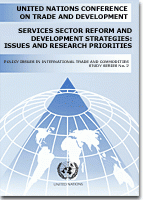
The implementation of strategies for domestic policy reform, for General Agreement on Trade in Services (GATS) negotiations and for business development in the services sector of developing economies can be supported by the empirical work which is examined or proposed in this paper. The paper makes the case for a more coherent approach to the design of reform policy in the services sector. It stresses the importance of considering the interaction between services activities, between modes of supply and in some cases between goods and services. It also identifies limits to the progress towards the goal of coherent policy making in the services sector. These include lack of information and political economy constraints.
The paper contains a review of recent work on the measurement of impediments to trade and investment, including research on banking, telecommunications, engineering, architecture, accounting, legal services, distribution and maritime services. There is evidence in this work of significant impediments to entry into services activities by all modes of supply and of significant discrimination against foreign suppliers. The implied price effects of these impediments in banking and telecommunications are high in some economies.
The paper also presents one set of modelling results of the effects of liberalization. These results highlight the value of a horizontal approach to policy making and the value of a focus on market access compared to national treatment issues. Suggestions are made about the next steps in a work programme on the nature of services sector policy and its impact. This includes wider participation by developing economies in empirical projects, more testing of methodologies being employed in those projects and the development of a framework for the consideration of issues of domestic regulation and the design of competition policy. All this work will have important spinoffs for the effectiveness of participating economies in GATS negotiations.


